COP27 photo essay: Reflections on the world’s largest climate conference, and what’s next

Turning up the volume on calls for food system change
From November 6-18, world leaders, innovators, and problem-solvers from around the world came together in Sharm El-Sheikh, Egypt to rally political will, science-based solutions, and bold action toward addressing the global climate challenge. While there remains much to do and finite time to do it, COP27 raised the volume on the call for change—with calls for food systems change louder than ever.
At COP26, food and agriculture were peripheral at best, with little attention paid to the climate impacts of our food system. This year, due to the efforts of GFI and a host of organizational partners, food earned a top spot on the COP27 agenda, with alternative proteins featured as an essential solution for meeting climate, food security, global health, and biodiversity goals.
As one of nine co-hosts of the first-ever Food Systems Pavilion and a contributor to multiple others, GFI was there alongside policymakers, private sector practitioners, nonprofits, youth, and indigenous leaders to put forth solutions to meet the moment. In the months leading up to COP27, we conducted in-depth assessments of country-level climate goals, identifying regionally relevant ways that alternative proteins can bolster action plans to cut emissions and adapt to climate impacts.
Our central, unifying prompt: what if we could build a more resilient, net-zero, nature-positive food system that still provides people with the foods they love?
Here’s our top moments, milestones, and mission-critical next steps:
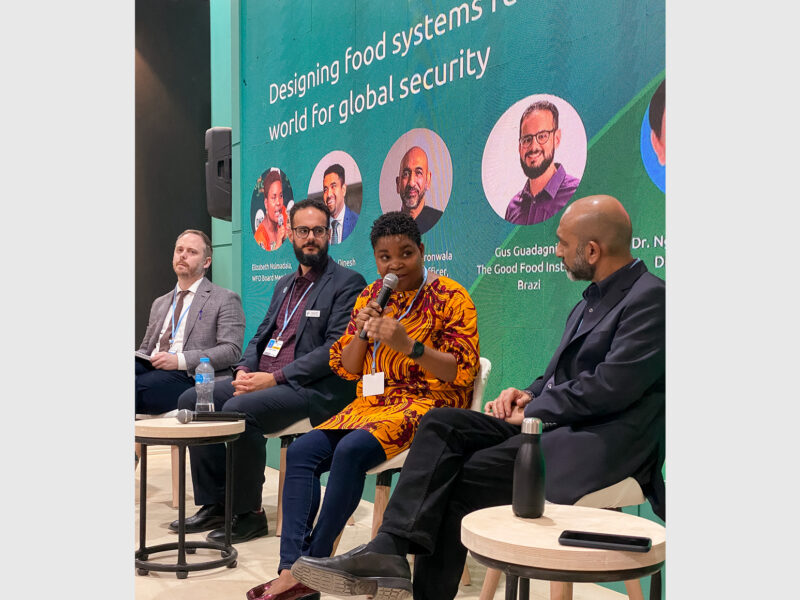
#1 Talking alt proteins on opening day of COP27
Nov. 6: On the opening day plenary of COP27, GFI Brazil’s managing director Gus Guadagnini and Infarm CEO Sudhanshu Sarronwala listen in as Elizabeth Nsimadala, World Food Organization board member, delivers a keynote address on the importance of food system transformation given the all-too-real challenges of water scarcity, nature loss, and food insecurity. Cutting right to the chase on Day 1, Gus called on governments around the world to invest in alternative proteins: “Alternative proteins are one of the most important solutions to reach climate resilience. We need to invest at least $10 billion a year in alternative protein research, development, and commercialization to get this solution to the scale the world needs.” As a co-host of the Food Systems Pavilion, GFI led and co-led multiple sessions like this one throughout the two-week conference, and brought together representatives from The Nature Conservancy, World Economic Forum, World Resources Institute, and other NGOs, government agencies, and indigenous and youth leaders to focus on actions, strategies, and solutions that have the potential to drive the transformation toward healthier, more resilient, and more equitable food systems.
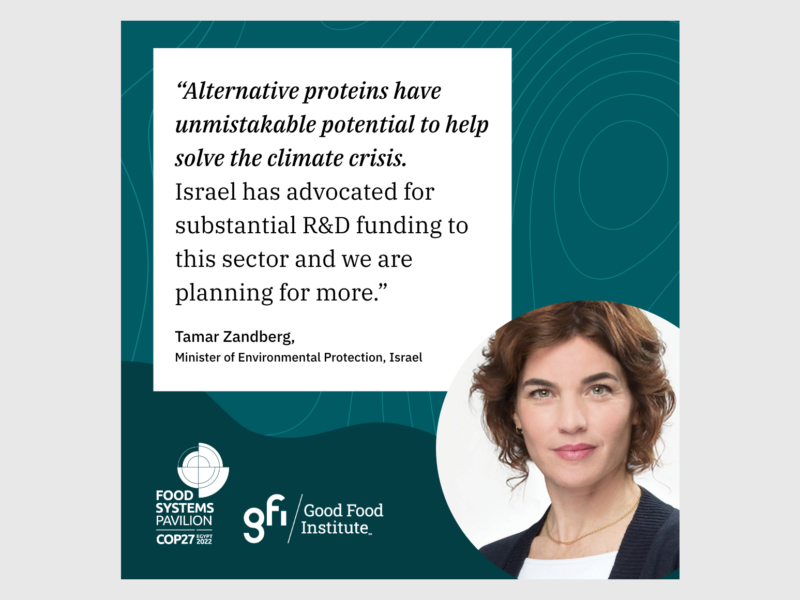
#2 Solving the protein dilemma through smart policy and financing
Nov. 8: Tamar Zandberg, Israel’s Minister of Environmental Protection, delivered opening comments during a GFI-led session on Day 3— “Solving the protein dilemma through smart policy and financing.” GFI investor engagement manager Sharyn Murray, moderated the expert panel that followed, featuring colleagues from FAIRR Initiative, the Brazilian National Ministry of Agriculture, IBD Invest, Asian Development Bank, Mosa Meat, and The EVERY Company. Sharyn and panelists shared the state of global investments in alternative proteins to date, while illuminating how much more is needed if we are to scale solutions in time to dramatically and quickly reduce emissions. The session marked the first time ever on a COP stage that policymakers, investors, and industry leaders gathered to focus on how government, finance, and innovation can work together to scale the alternative protein sector and accelerate alt proteins as a game-changing solution to global climate and food insecurity.
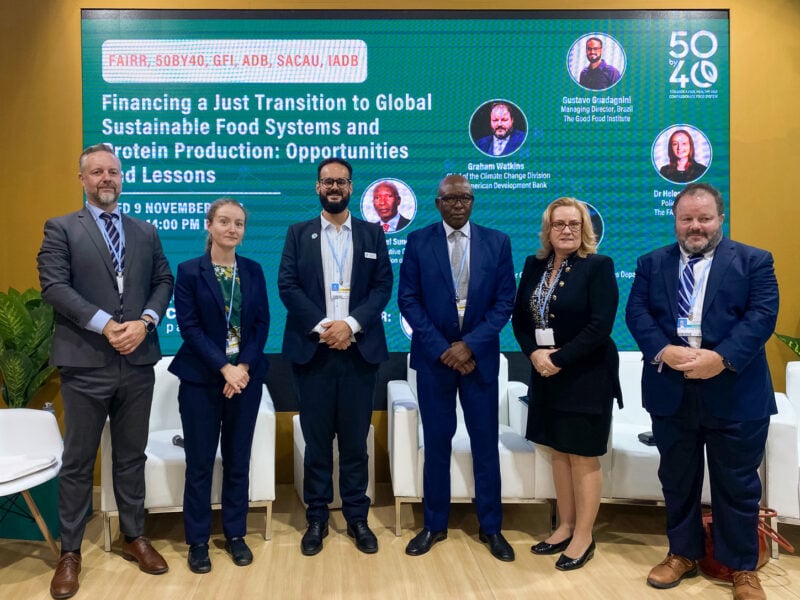
#3 GFI, FAIRR, and 50by40 focus on financing a just transition
Nov. 9: 50by40 and FAIRR together hosted “Financing a Just Transition to Global Sustainable Food Systems and Protein Production: Opportunities and Lessons” at the Food4Climate Pavilion, one of several food-focused pavilions at COP27. During this session, GFI Brazil’s managing director Gus Guadagnini engaged in conversation with high-level climate investment experts, including representatives from the Inter-American Development Bank, the Southern African Confederation of Agricultural Unions, Asian Development Bank. While many conversations at COP naturally focus on ecological sustainability, Gus introduced some other important factors to consider when advocating for climate solutions— like alternative proteins—such as public health and preservation of cultural practices.
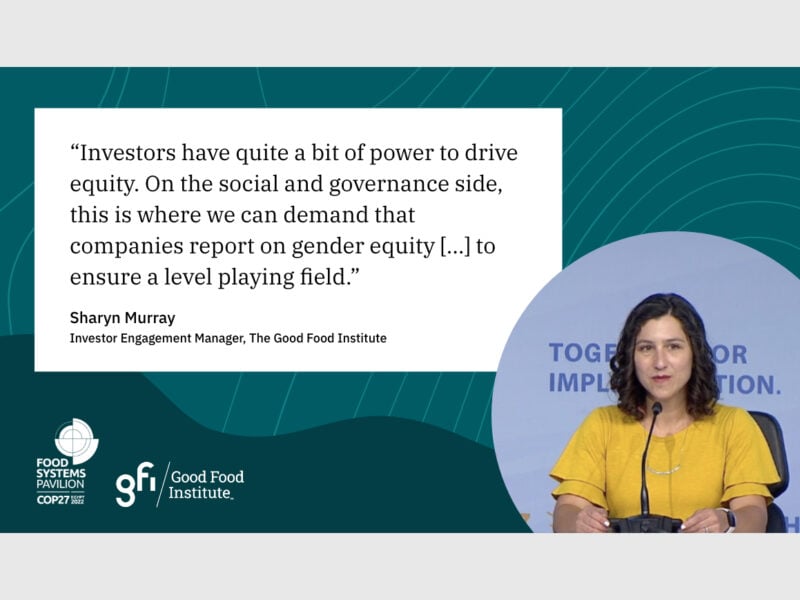
#4 GFI’s Sharyn Murray speaks to the power of investors to drive equity
Nov. 9: GFI’s investor engagement manager Sharyn Murray was invited to speak at a United Nations press conference on the state of women in the future of food—a first-of-its-kind event. This critical discussion was hosted by the Vegan Women Summit in collaboration with ProVeg International. One clear theme that emerged: the importance of meaningfully engaging mothers, the world’s leading consumer, in food systems conversations—including conversations about alternative proteins. Sharyn was joined on stage by prominent thought leader and author of “The Future of Food is Female,” Jennifer Stojkovic. Stojkovic also supports GFI’s mission, stating that “alternative protein is not the only solution to the climate crisis. But there is no solution to the climate crisis without it.”
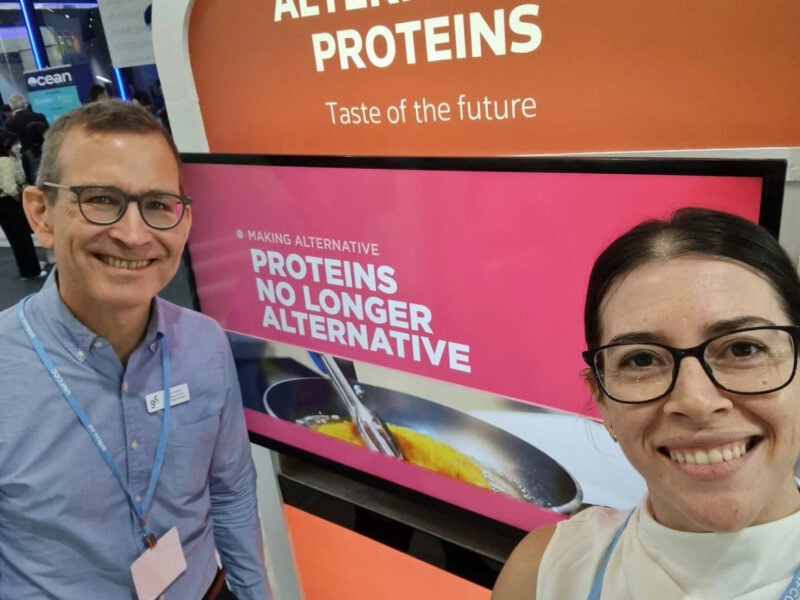
#5 Israel pavilion broadcasts its support for alternative proteins
Nov. 10: GFI president Bruce Friedrich and GFI Israel vice president of strategy and policy Alla Voldman visit the Israel pavilion, where alternative protein innovation was championed as a key climate solution. Here, they stand alongside a kiosk characterizing alternative proteins as a “taste of the future.” This interactive educational tool was on display throughout the full two weeks of COP, demonstrating Israel’s clear commitment to the cause. The kiosk’s reel even includes a slide with GFI’s vision, nearly word-for-word: “Making alternative proteins no longer alternative.” Wow!
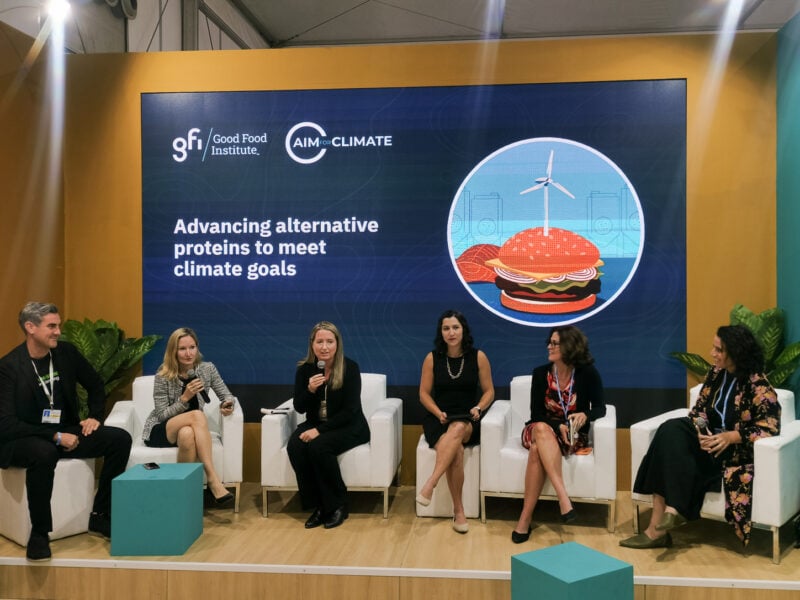
#6 GFI led an AIM for Climate Roadshow event focused on alt proteins
Nov. 10: GFI led an AIM for Climate Roadshow event at COP27, “Advancing Sustainable Protein Innovation Through Research,” in which we were joined by USDA senior policy advisor for climate Jaime Adams, FAIRR executive director Maria Lettini, Aleph Farms vice president of sustainability Lee Recht, and Compassion in World Farming’s US executive director Ben Williamson. We presented GFI’s two alt protein-focused AIM for Climate Sprints: “Advancing Sustainable Protein Innovation through Research” and “ESG Framework for Alternative Protein Products,” which were launched that same week on the AIM for Climate website. During the session, USDA senior policy advisor advisor for climate, Jaime Adams, made clear the urgency: “We need alternative protein and we need it now. We don’t have 30 years and cannot come back year after year waiting for something to be done.” On the same day, U.S. president Joe Biden was on the conference floor, declaring that the U.S. will meet its emissions targets by 2030, including cutting emissions by at least 30%.
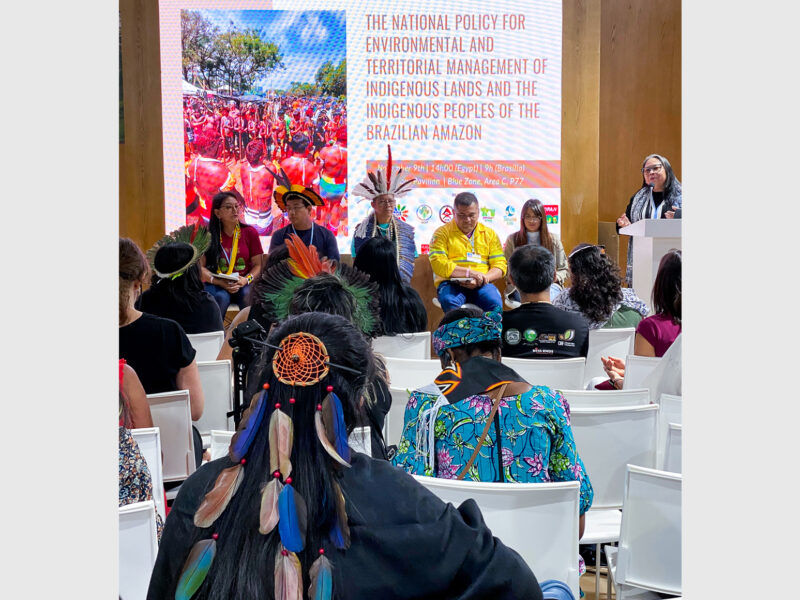
#7 GFI Brazil delegates listen and learn from Brazilian Indigenous leaders
Nov. 12: GFI Brazil’s Mariana Bernal is the eye behind this shot, capturing a moment as she listened and learned at “The National Policy for Environmental and Territorial Management of Indigenous Lands and Indigenous Peoples of the Brazilian Amazon.” The knowledge shared during this session is especially relevant for Mariana and the GFI Brazil team, which spearheads the Biomes Program, a research project aimed at unlocking the potential to transform plant species native to the Amazon and Cerrado biomes into food ingredients that the alternative protein industry needs and that can create more sustainable sources of income for local communities. Understanding and learning from traditional ecological knowledge will be essential for the success of the program.
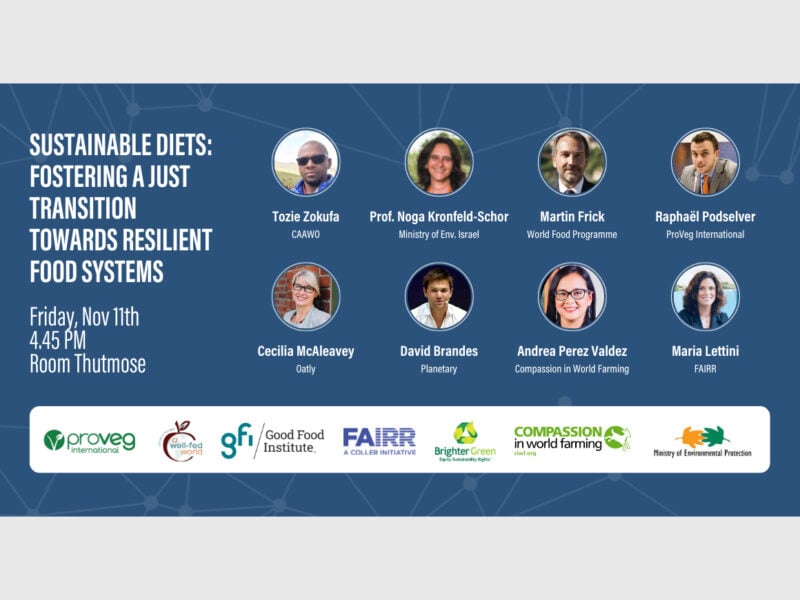
#8 GFI convened food sustainability experts and sustainable protein startups
Nov 11: On this day, GFI co-hosted an official UNFCCC side event, “Sustainable diets: fostering a just transition towards resilient food systems.” GFI brought together a globally diverse group of food sustainability experts and alternative proteins startups—ProVeg International, Israel’s Ministry of Environmental Protection, the World Food Programme, the Coalition of African Animal Welfare Organisations, Compassion in World Farming, FAIRR, Oatly, and fermentation company, Planetary—and secured their place on the COP27 agenda to (i) educate audiences on the potential for alternative proteins to reduce emissions, land, and water use and (ii) advocate for a “just transition” for the livestock sector.
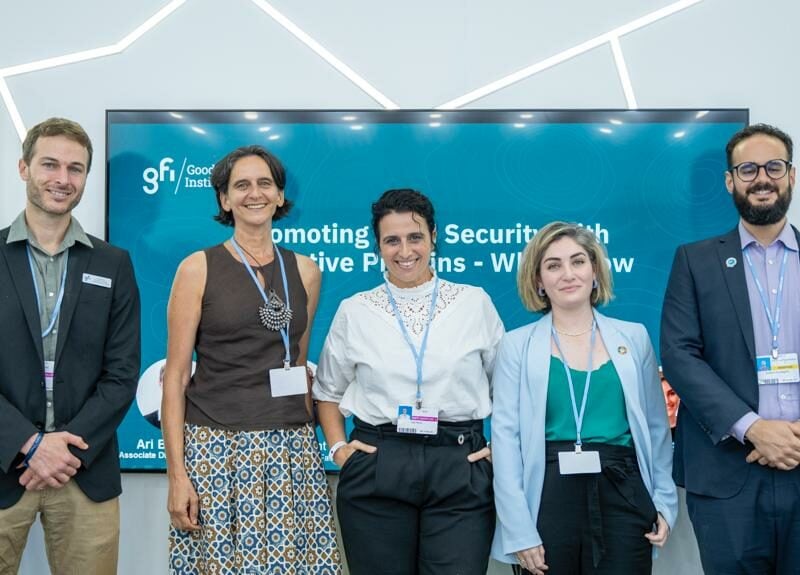
#9 GFI Israel and Brazil collaborated for a panel on food security and alt proteins
Nov. 12: At a GFI Israel-led event at the Israeli pavilion, titled “Sustainable Proteins – Promoting Food Security Using Science & Policy”, GFI Israel’s associate director Ari Ben Dror presented an overview of alternative proteins’ impact on food security, while GFI Brazil’s Gus Guadagnini presented GFI’s work in Brazil and its potential in combatting food insecurity. The presentations were followed by a panel discussion moderated by Ari, where Gus was joined by representatives from Israeli government, industry and startup – the chief scientist of Israel’s Ministry of Environmental Protection Noga Kronfeld-Schor, Aleph Farms vice president of sustainability Lee Recht, and Strauss Group’s vice president of sustainability Shay Bialik.

#10 Delegates enjoyed a cultivated chicken dinner from GOOD Meat
Nov 12: On the outskirts of the COP27 conference venue, the Four Seasons was the place where a handful of lucky participants had the chance to eat cultivated chicken shipped in from Singapore, compliments of California-based GOOD Meat. This marks the first time cultivated meat has ever been served as part of a global climate summit. The Singapore government and GFI APAC collaborated to ensure that cultivated meat could be imported into Egypt, where such products are not approved for commercial sale–yet.
Photo credit: GOOD Meat
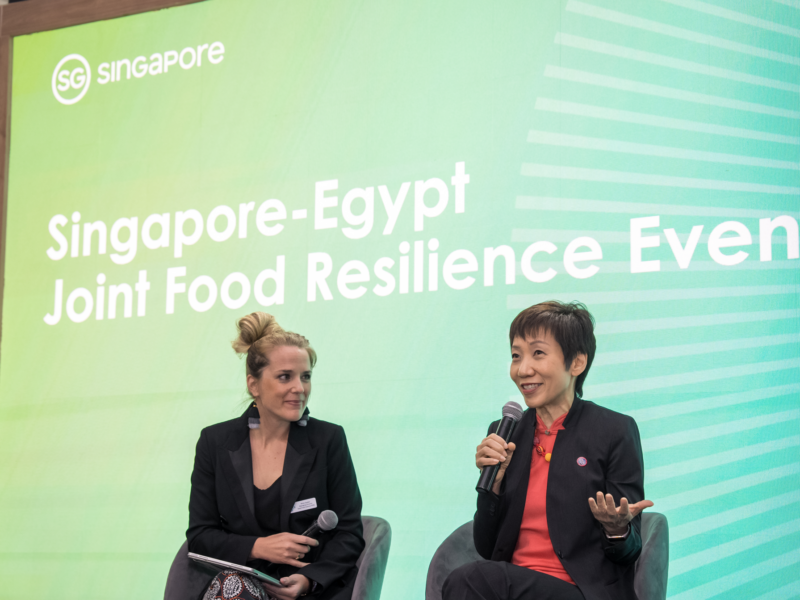
#11 Conversation sparked between GFI APAC and global climate ministers
Nov 12: Over at the Singapore Pavilion, Minister for Sustainability and the Environment Grace Fu joined her Egyptian counterpart, Minister of Environment of the Arabic Republic of Egypt Dr. Yasmine Fouad, for a thoughtful conversation on national approaches to building food resilience, moderated by GFI APAC managing director Mirte Gosker. Novel foods have “much potential to supplement food security,” Minister Fu told Mirte, because their production “utilizes less land and has a smaller carbon footprint compared to conventional animal proteins.”
Photo credit: Singapore Pavilion at COP27
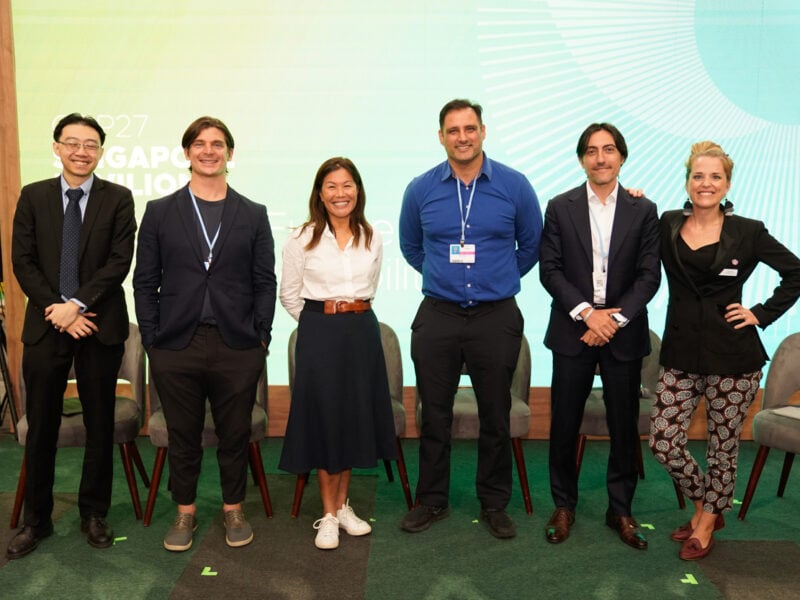
#12 Singapore Pavilion hosts all-star alt protein panel
Nov. 12: GFI APAC’s Mirte Gosker moderated a high-profile discussion titled “Alternative Proteins: Boosting Sustainable Food Security Resilience Through Science.” Singapore Food Agency branch head for risk assessment and communications Low Teng Yong joined Nurasa CFO Elaine Cheung, Growthwell Foods CEO Manuel Bossi, TurtleTree co-founder Max Rye, and Eat Just CEO Josh Tetrick for a lively conversation about regulatory, technical, and infrastructural hurdles that must be overcome to help alternative proteins reach their full potential.
Photo credit: Singapore Pavilion at COP27

#13 Sustainable food experts discuss how to feed 10 billion people by 2050
Nov. 12: GFI senior associate director of international engagement Stephanie Von Stein joined Impossible Foods founder and CEO Pat Brown, Mosa Meat’s chief scientific officer Mark Post, and other sustainable food experts in a fireside chat at the UN Global Innovation Hub to discuss how alternative proteins can help ensure the nutrition and health of the world’s projected 10 billion people by 2050.

#14 Global climate leaders convene for minister-level cultivated meat dinner
Nov. 14: Jointly organized by GFI APAC, GOOD Meat, and the Singapore Pavilion, this historic dinner was hosted by Minister Grace Fu and drew current and former senior officials from 10 nations: Bhutan, Cambodia, Colombia, the Dominican Republic, Indonesia, Laos, Malaysia, San Marino, Singapore, and the United Arab Emirates.
Photo credit: GOOD Meat
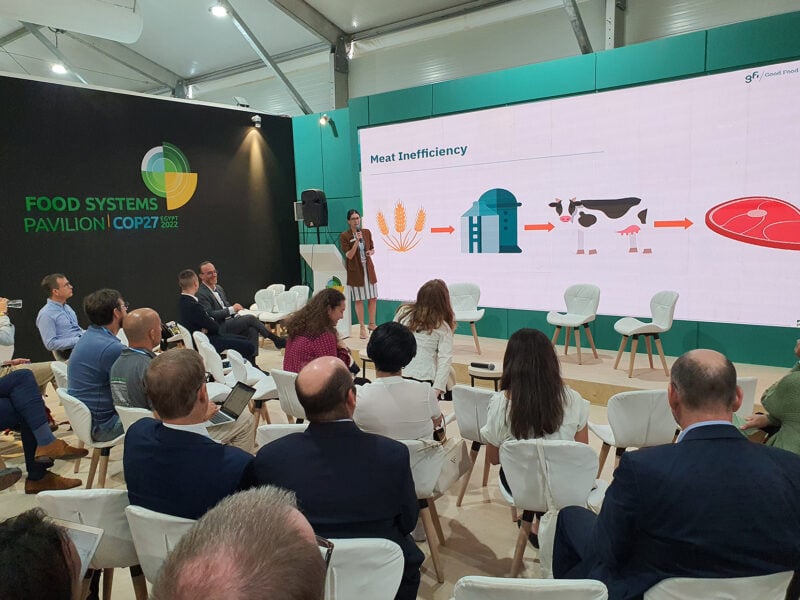
#15 GFI highlights the inefficiencies of conventional meat production
Nov. 15: GFI Israel’s vice president of strategy and policy Alla Voldman opens the Food Systems Pavilion demo stage event, “Meat vs. Earth: Either or both?” She was joined by Aleph Farms co-founder and CEO Didier Toubia and Orbillion Bio co-founder and CTO Gabriel Levesque-Tremblay. In addition to learning about the basics of cultivated meat science and industry, session attendees were able to take an up-close look at Aleph Farms cultivated steak—one of the world’s latest and greatest climate innovations.
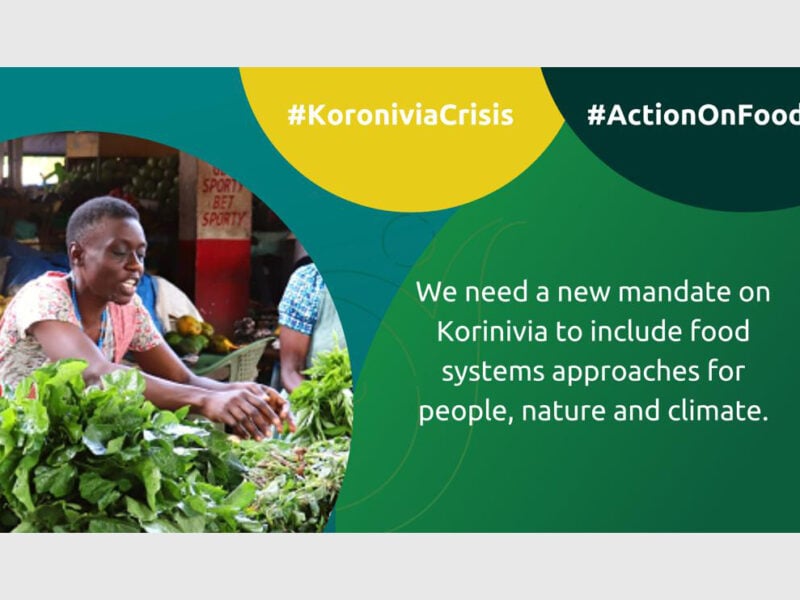
#16 Over 100 orgs call for updates to the Koronivia Joint Work on Agriculture
Nov. 15: GFI joined more than 100 global food organizations to sign an open letter calling on ministers and negotiators to raise the ambition and scope of the mandate for the successor of the Koronivia Joint Work on Agriculture—a landmark decision recognizing the unique potential of agriculture in tackling climate change. References to food systems approaches had been reduced and the original text stripped of critical interventions such as nutrition and dietary shifts, adaptation and mitigation work-plans and mentions of follow-up workshops—all of which had not been adequately addressed by the end of COP27. With a nod to what’s next, however, the joint statement urged “The Convention on Biological Diversity’s COP15 is another major milestone on the road to formally recognising food systems as a key part of global climate solutions and our work will continue across fields, forests, land, seas and boardrooms. We will not rest until food systems deliver for people, nature and the climate.”
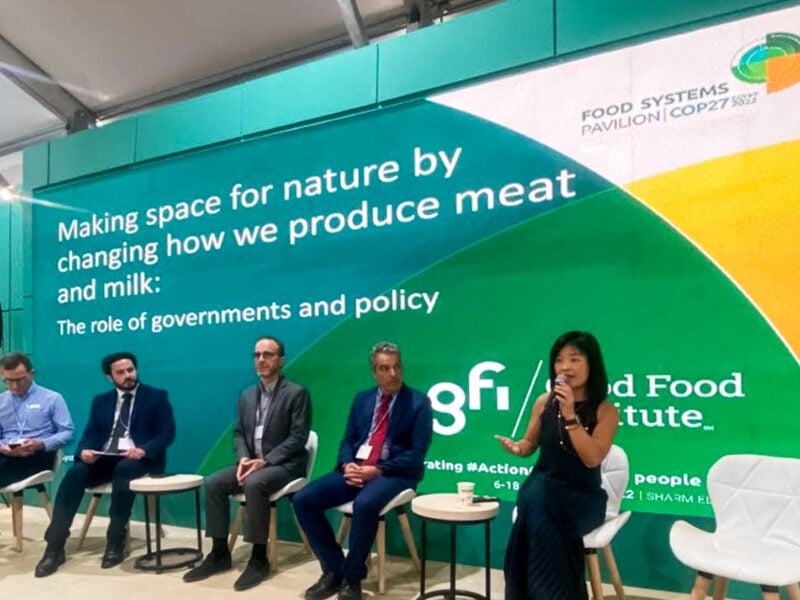
#17 Ending deforestation by 2030 won’t be possible without reimagining protein
Nov 16: The GFI team was thrilled to serve as the lead host of Biodiversity Day at the Food Systems Pavilion. Our opening session featured World Resources Institute research director Nancy Harris making clear the “global land squeeze” underway with competing pressures for food and land. GFI’s own Bruce Friedrich then moderated an expert panel with representation from FAIRR, TurtleTree, Aleph Farms, and the Israeli Ministry of Foreign Affairs, all highlighting the important role that governments play in food systems transformation. As a result of COP26 negotiations, the United Nations set the ambitious and necessary goal of ending deforestation by 2030. This GFI-led session— “Making space for nature by changing how we produce meat and milk: The role of governments and policy”—pointed out that ending deforestation by 2030 won’t be possible without reimagining protein production. “Our food systems today are a major source of the problem. Alternative proteins are extremely important in creating food security and making us more resilient to global shocks in the supply of food,” stated Ambassador Gideon Behar, special envoy for climate change and sustainability, Israeli Ministry of Foreign Affairs, “You [GFI] are showing us a path to come out of the climate crisis.”
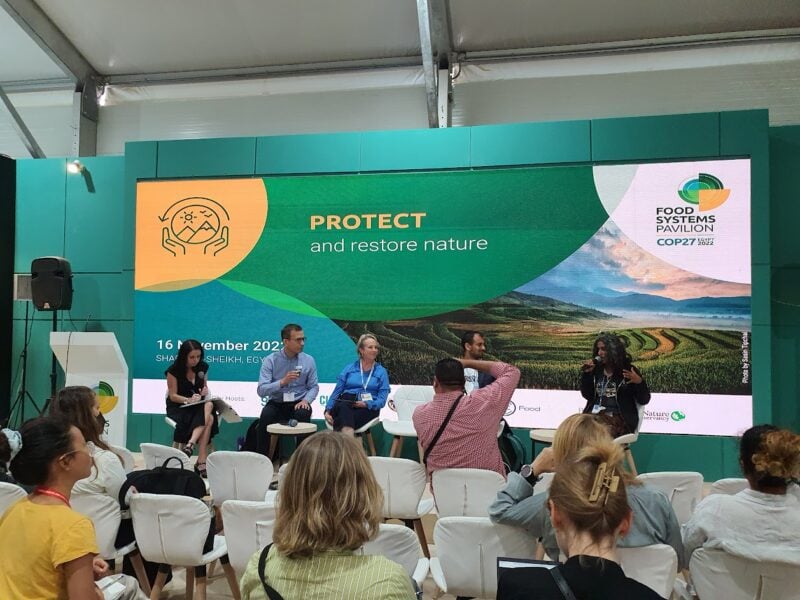
#18 GFI brings groups working in food, global health, and biodiversity together
Nov. 16: The theme of GFI’s Biodiversity Day plenary was “Inviting everyone to the table: How a diversity of nature-inspired food solutions and stakeholders can enable a global recovery for biodiversity,” This was perhaps one of the most challenging, complex, and thought-provoking sessions that GFI and its partner organizations hosted at the Food Systems Pavilion. Expert moderator Dani Nierenberg prompted panelists with the need to advance cutting-edge agricultural solutions while also amplifying the work of indigenous communities, who have been doing this work (ecosystem stewardship) for tens of thousands of years. Rupa Marya, executive director of Deep Medicine Circle, shared her perspective on the impact of colonial capitalism on ecosystems and the dangers of an industrialized food system—even if that food system includes alternative proteins. She also called for reframing farmers as stewards of health, and echoed calls for bold policies that could bring about change rapidly, especially at the intersection of food, agriculture, and public health. Jane Madgwick, CEO of Wetlands International spoke to the at-risk water systems that underpin all food production, and the benefits of agroforestry systems that can simultaneously support biodiversity and food production. Discussions like these inspire us to continue connecting with, learning from, and engaging a diversity of people working across the entire value chain of our global food system, to find common ground solutions that do the most good possible.
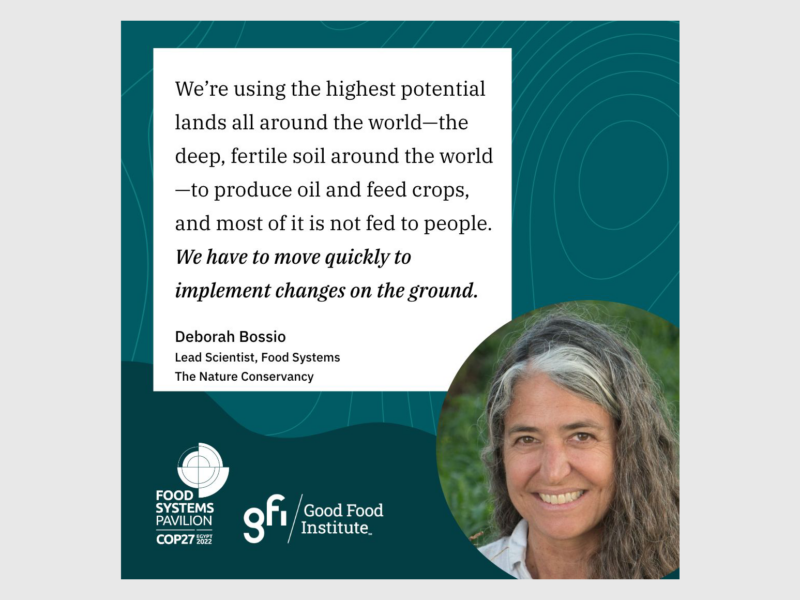
#19 TNC experts join GFI Brasil to focus on zero-conversion agriculture
Nov. 16: The Nature Conservancy partnered with GFI to co-craft a ninety-minute session to appreciate the connections between biodiversity protection and sustainable food production. “Zero-conversion food: Feeding a growing world in ways that enable recovery of biodiverse lands and waters” highlighted powerful case studies of science-driven, traditional ecological knowledge-informed agricultural innovations in Argentina, Brazil, and The Bahamas. Deborah Bossio, The Nature’s Conservancy’s leading expert in food systems science, presented right alongside Vanessa Haley-Benjamin, an alternative protein scientist and PhD Student at Newcastle University studying cultivated mollusks.
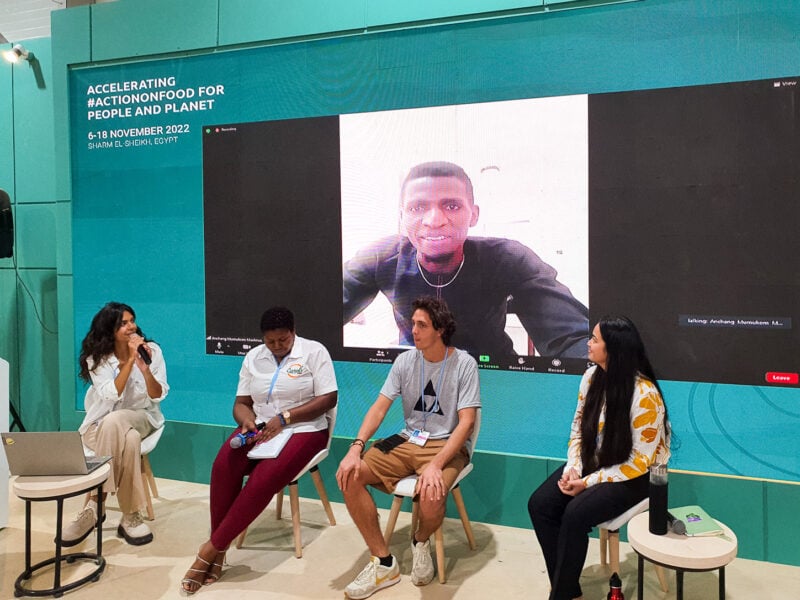
#20 The University of Nigeria’s Alt Protein Project is represented at COP27
Nov. 16: GFI organized a panel discussion specifically to center voices of youth leaders working in food systems transformation. “Food system careers of the future: Insights and aspirations from youth leaders” featured Anchang Mumukom Maximus, co-founder and director of research of the University of Nigeria Alt Protein Project. Joining virtually, he reflected on his plans for the future: “In ten years, I see myself in the alternative protein field. I see myself, in the future, like a mentor, mentoring young scientists that want to take up careers in the alternative protein field.”
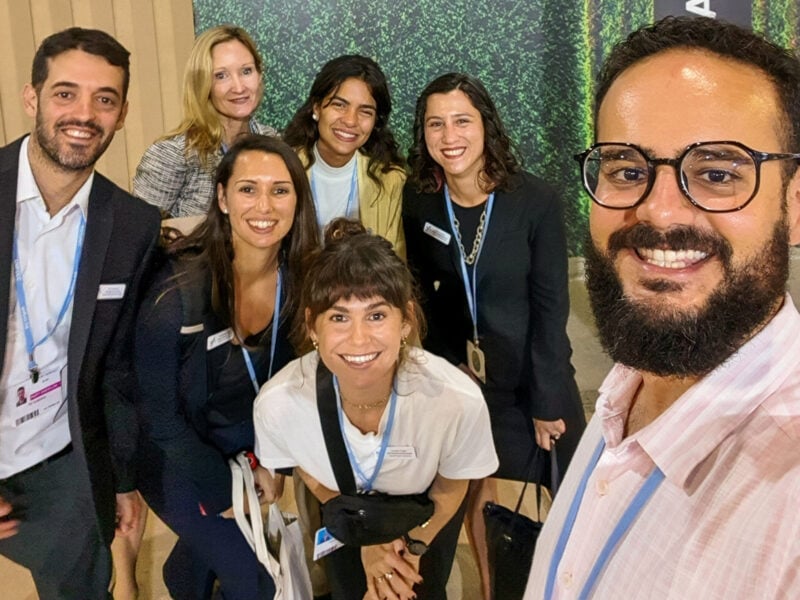
BONUS: GFI delegates take a beat to bond on the COP27 floor
At some point during the incredible two weeks of COP27: GFI Brazil’s Gus Guadagnini, expert selfie-taker, gathers members of the GFI delegation for a moment of team bonding and gratitude. Gus’s own words capture it best: “I came to Egypt to represent The Good Food Institute Brasil in discussions of the international community on the climate crisis. For the first time, we have pavilions dedicated to discussing food systems and the theme of Alternative Proteins grows more and more. I’m still digesting everything I’ve learned by getting in touch with so many people, with their most varied cultures. At this point, I want to celebrate the space we had to show our solution: it is impossible to meet the goals of climate agreements without investing much more in the alternative protein industry. In a talk, I heard the phrase ‘We need to be a strong voice, but we also know how to shut up and listen.’ So I go into the week that begins: ready to be a strong voice for our field, while learning from so many amazing people who are here. Strength and humility, a combination that only does well.”
Working together toward a brighter food future
As we reflect on this global gathering—acknowledging all the ways in which the world is still falling short as well as the bright signs of solutions and progress—we find ourselves more committed than ever to a future where alternative proteins are no longer alternative.
Near the end of COP, the UN Food and Agriculture Organization issued a new report on bioeconomies, with a solid nod the role of food in humanity’s future: “In addition to climate mitigation gains, new food sources could reduce pressure on forests and land used for feed, support the preservation of biodiversity and planetary health, and contribute to preventing forms of malnutrition in developing countries.” Indeed.
GFI’s work at COP27, as well as its year-round work with scientists, businesses, and policymakers across the global food system, is powered by philanthropy. Thanks to our donors, we are able to advance the alternative protein ecosystem by focusing on solutions that are global, tractable, and high-impact.
If you are interested in learning more about giving to GFI, please visit here or contact philanthropy@gfi.org.

Page
The good food future
Your support powers our work in advancing alternative proteins as an essential solution to meet the world’s climate, global health, food security, and biodiversity goals. Let’s create the good food…


